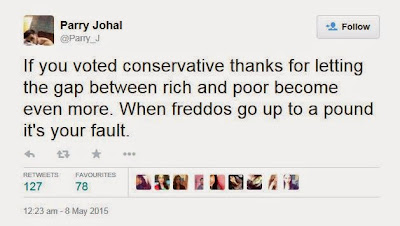 |
Image credit: Nemo
|
Despite the majority of people having lost faith in politics, established parties still managed to come out on top in the polls, with the Conservative and Labour party claiming a sizeable amount of seats in the House of Commons, the Tories ultimately winning the most.
Smaller parties, such as controversial UKIP and Green Party, managed to secure only one seat in parliament…yet the SNP 56 seats, despite gaining comparatively fewer votes.
So how does that work? Well to understand, you have to delve into how the voting system in the UK works.
There are 650 seats in Parliament, representing each constituency in the UK. When you vote, you’re voting for a party’s representative in YOUR constituency. So even if you support, say, the Green party, you would only be able vote for them if there was a representative for that party in your local area/constituency.
For a party to put forward a representative for their party in each constituency, they need to put down a deposit. This isn’t always possible if you’re a smaller party with limited funds. If you wanted to put a representative forward in each constituency, you would need £325,000 and that’s before campaigning, PR and all the rest of it.
So…even though it’s a democracy, you can see there’s a capitalist element to it.
Now, onto the issue of how you manage to secure millions of votes, yet still only manage to secure one seat in Parliament… you see, to win seats (and therefore have ANY kind of influence in the Houses of Parliament), you have to secure these votes across a number of constituencies: you need widespread popular vote. These votes can’t be concentrated to a limited number of areas, because even if you’ve collected plenty of votes your popularity is limited to just that area.
That’s how the SNP, who had less votes than the Liberal Democrats and UKIP, managed to gain more seats; they secured a top number of votes across a number of constituencies in Scotland. These were smaller constituencies, hence a lower vote count, but they still came out on top.
Then you have to factor in the competition: you could secure millions of votes, but if a party gets just one more vote, they take control of that constituency. Parties like UKIP were fighting against established parties such as the Tories and Labour. The Liberal Democrats had emerged as a real contender for the Big Two in the past, but that all went to pot with the whole tuition-fees fiasco.
So, it’s still a democracy in the sense that parties have to accumulate a top number of votes in each area. But it doesn’t just depend on how many votes you have, it’s WHERE you managed to secure the most votes (as the level of competition can vary and also, you can secure lots of votes, but you still need enough to overtake the more popular/influential parties in that area), and in how many places you managed to get these top votes.
This has exposed a flaw in the system, as you could focus your campaign on smaller areas, end up with fewer votes yet still have more seats in Parliament, which on a larger scale doesn’t really represent the voters.
It is also open to all sorts of other tactical voting, as well as giving us non-voters an excuse because realistically, unless you vote for one out of the two most popular parties your vote is wasted...which has led to many disgruntled voters calling for proportional representation.
That’s my understanding of UK politics anyway. Hey, this could all be a ruse and the decision may already have been made for us, and people who vote are being given a false sense of power. Stranger things have happened.
But hey, at least we don’t need to worry about it for another five years... we just worry about this instead :P


No comments:
Post a Comment